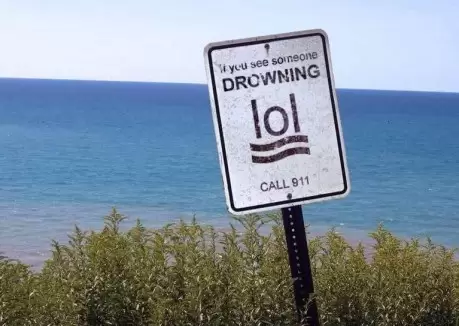If you follow political or financial news, you probably saw the Government Accountability Office’s report about redundancy in the federal government.
If you’ve ever worked in Corporate America, you know exactly how bad redundancy can be in a large company. Then extrapolate that for something the size of the federal government. All of a sudden, finding a trillion dollars in savings doesn’t sound all that hard.
The reason I am such a big proponent of decreased government spending is because in almost all cases I believe the private sector does things better. If you don’t believe me, ask yourself the following question:
When is the last time you heard someone say
“I was drowning in debt and just didn’t understand how to fix my personal finances, but then [insert federal financial literacy program] came along and saved the day!”
My hope is that you hear it all the time, because according to this report our tax dollars are funding 56 programs spread out over 20 organizations! I don’t know how much money they are spending, but I’m sure it is well into the millions or even hundreds of millions.
Now ask yourself the same question, but insert Dave Ramsey, or Suze Orman, or any one of your favorite privately owned personal finance websites and blogs, instead of a federal program. The private sector has been incredibly successful in teaching Americans personal finance.
The United States Federal government is spending (and wasting) literally millions of dollars to unsuccessfully teach people financial literacy while the country is drowning in debt.

Trying to learn financial literacy from our government is like trying to learn to swim from someone who is literally drowning as he teaches his class.
- The National Debt is over $14 trillion (with a T)
- The proposed 2012 deficit is over $3.7 trillion (again, with T)
Forget redundancy. If it were up to me, I would get rid of all 56 programs. This is one area the government has completely and utterly failed to improve. The private sector may still have some work to do, but we’re doing a much better job than Uncle Sam.
Maybe once Uncle Sam learns to manage his own finances, then he can start worrying about teaching other people how to manage theirs.
Kevin McKee is an entrepreneur, IT guru, and personal finance leader. In addition to his writing, Kevin is the head of IT at Buildingstars, Co-Founder of Padmission, and organizer of Laravel STL. He is also the creator of www.contributetoopensource.com. When he’s not working, Kevin enjoys podcasting about movies and spending time with his wife and four children.


Careful there friend! That’s a pretty big blanket statement. While I agree that there is financial redundancy, I think there needs to be careful consideration about what programs to cut. Especially programs geared towards kids who can’t help it that their parents make poor decisions. The National School Lunch Program and the School Breakfast program, for instance. That funding goes strait to kids who need good nutrition, so that they can have enough energy to learn, so that hopefully a few of them can break the cycle and make a big difference in this world! Just throwing some optimism in the mix.
I’m fine with those two programs. I just want to cut the financial literacy programs. 🙂
I wrote a post a while back called “The solution to financial illiteracy doesn’t lie in schools”. The point of the article was that teachers generally aren’t wealthy, so why should they be the experts on personal finance?
You’re right, let the Daves and Suzes of the PF world teach people how to get out of debt. If someone wants to get out of debt, there are thousands of resources out there for them to tap. It’s all about getting started and getting at the plan.
Why is the government meddling in something they clearly aren’t equipped to handle? It doesn’t make sense to me.
The Fed publishes lots of great data and helpful resources to people that chose to read them. So do other government organizations. The good financial advice from the Fed, FDIC, Hud… is much better than that spouted by popular personalities. The cost of financial literacy efforts by the government I would wager are very small. I would be very surprised if the country didn’t get a huge net benefit.
To cut government spending you have to cut programs that actual spend real money: the Department of Defense, Medicare, Social Security, Medicaid, Worrying about all sorts of tiny expenditures would be fine if we addressed the real expenses first. Otherwise is it like someone focusing on their personal budget by seeing if they can cut their expenditures on pencils and paper while they ignore health care, housing, food, transportation, entertainment…
It is perfectly sensible to save money wherever you can. But for decades we increase the huge expenditures and yet talk about cutting things that are less than .001% of the expenditures. It might make sense. But it is insignificant compared to actually cutting things that are costing real money.
Interest on the debt costs about 5% of the budget (and that cost is going to go up a huge amount once rates reach a more sensible level).
Thanks for this reply John. You are absolutely right in saying that the true problem can only be fixed by addressing the largest expenses. However, I see this a low hanging fruit. Just chop it off and move on.
Not only is the private sector doing better than the government, most of it is free to the consumer. It doesn’t cost anything to listen to Dave Ramsey on the radio. Turbo Tax and other software will even provide free tax preparation for people with low incomes. My girlfriend just used their free online software.
I agree that I wouldn’t focus any substantial effort in determining which of these programs should exist and which should go away; I say cut them all and move onto the more important stuff you talked about.
Instead of spending billions on financial literacy, I would be happy to see an ad on annualcreditreport.com instead of all those ‘supposedly’ free credit report/score sites!
When you say that it’s easy to see how we could save a trillion dollars, where did you get that figure? I looked through that GAO report and couldn’t find a summary of how much they proposed saving. They only included a handful of examples with dollars attached. I think the biggest one was $54 billion, which comes down to about $4 a month for a working American household.
I threw a trillion dollars out there as hyperbole; it didn’t come from the GAO. The point I was trying to make is that I work in corporate America, and I have insight into millions and millions of inefficiencies, just from my little job in a company of hundreds of thousands. Then when you think about the inefficiencies that are probably there in something much bigger than my company (the federal government), then there has to be a lot to save.
I am afraid that so much energy will be expended in fighting the entrenched interests here that there will be little left over to have serious policy debates